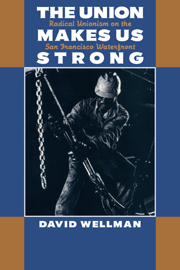Book contents
- Frontmatter
- Contents
- Preface
- Notes on unpublished sources
- PART I LABOR RADICALISM REVISITED
- PART II LOCAL COMMUNITY AND “TUMULTUOUS” DEMOCRACY: THE SOCIOCULTURAL FOUNDATIONS OF UNIONISM ON THE SAN FRANCISCO WATERFRONT
- PART III UNIONISM, WORK, AND TECHNOLOGICAL CHANGE
- PART IV WAGING THE BATTLE FOR WORKPLACE CONTROL ON CONTRACTUAL TERRAIN
- PART V AGREEING TO DISAGREE: BEING DEFENSIBLY DISOBEDIENT
- Conclusion: Trade union exceptionalism or prefigurative politics?
- Appendix: Doing field research: An ethnographic account
- References
- Name index
- Subject index
PART V - AGREEING TO DISAGREE: BEING DEFENSIBLY DISOBEDIENT
Published online by Cambridge University Press: 11 November 2009
- Frontmatter
- Contents
- Preface
- Notes on unpublished sources
- PART I LABOR RADICALISM REVISITED
- PART II LOCAL COMMUNITY AND “TUMULTUOUS” DEMOCRACY: THE SOCIOCULTURAL FOUNDATIONS OF UNIONISM ON THE SAN FRANCISCO WATERFRONT
- PART III UNIONISM, WORK, AND TECHNOLOGICAL CHANGE
- PART IV WAGING THE BATTLE FOR WORKPLACE CONTROL ON CONTRACTUAL TERRAIN
- PART V AGREEING TO DISAGREE: BEING DEFENSIBLY DISOBEDIENT
- Conclusion: Trade union exceptionalism or prefigurative politics?
- Appendix: Doing field research: An ethnographic account
- References
- Name index
- Subject index
Summary
THE patterns of disagreement produced by the ILWU-PMA contractual relationship indicate that the divisions between these two sides run deep. As the last three chapters suggest, the fight for management of the longshore enterprise continues; elements of the struggle over rival systems for production are still visible in the longshore industry. Thus, the issue of who governs the waterfront has not been effectively settled. In this regard, not much has changed since the 1930s.
What has changed, however, is that, contractually speaking, the issue is resolved; it was settled years ago. If the question of workplace governance was not formally laid to rest when longshoremen agreed to the terms of the 1934 contract, it was certainly established in 1966 when the IIWU agreed on paper to eliminate restrictive work rules. The collective bargain states clearly and unequivocally that longshoremen must do as they are told by employers. They must “work as directed.” The employers' right to direct work was reaffirmed, some would say reestablished, with the M&M Agreements and subsequently sustained by arbitrators' rulings. Thus, formally and legally speaking, the dispute over workplace regime has been resolved; and resolved in the employers' favor. On paper, they control the waterfront.
However, when one analyzes the accusations each side levels at the other in the grievance machinery, and observes contractual negotiations, it becomes quite clear that, practically speaking, the question of workplace regime has not been settled. Despite contractual prohibitions to the contrary, longshoremen continue to dispute managerial directives.
- Type
- Chapter
- Information
- The Union Makes Us StrongRadical Unionism on the San Francisco Waterfront, pp. 253 - 254Publisher: Cambridge University PressPrint publication year: 1995



